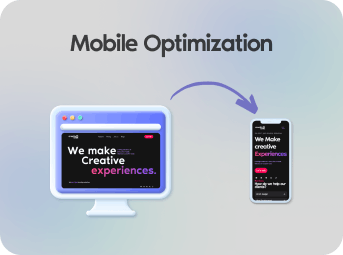
In today’s digital landscape, not having a website for your business is like trying to run a marathon with your shoes tied together – you’re not getting very far.
A website isn't just a virtual storefront; it's a dynamic platform where businesses can showcase their identity, connect with audiences far and wide, and leave a lasting impression. It allows customers to interact with your services from anywhere, at any time, and it helps to bring more legitimacy to your business and to get your name out there.
You can also gather valuable data about your website visitors, such as demographics, browsing behaviour, and preferences through web analytics tools, which can help you refine your marketing strategies and improve your business's performance.
Without this essential tool, your business might risk being left behind, overshadowed by competitors who have embraced the power of the world wide web.
But if you’re here, you probably already know why to create a website. The question is, how?
Whether you’re building your website yourself or hiring a team of developers, there are some crucial points to consider before diving in.
Know what you want
Recognizing your objectives is crucial in order to decide on the content, features, and functions of your website. Here are some good questions to ask yourself to get started.
- What are you trying to achieve by creating this website?
- What are the main problems or challenges that you want to overcome by creating a website?
- Is it easier accessibility for your customers?
- A way for them to quickly get in contact with your company?
- Is it to create more awareness about your brand?
- What features or functions do you want to prioritize?
- What are your business goals?
- What do you want your website to achieve in the long term?
The features, design and structure of your website relies on the goals you are trying to achieve, therefore, try to get as specific as you can with the answers.
Know what your customers want
A huge part of creating a successful website is knowing who you are creating it for. Who is your target audience? What is their background? What age/gender demographics you are trying to connect with?
You can even try creating a few user stories to understand what your target audience would expect from your website. A successful website should be optimized with the target audience’s needs in mind.
Choose your domain name

When choosing your domain name, aim for something memorable, short, simple, and easy to spell. It should be relevant to your brand but not overly specific, allowing room for possible future expansion of your services. Make sure you choose a relevant domain extension (e.g., .com, .net, .org). Additionally, you can incorporate relevant keywords to your domain name to enhance your SEO efforts.
Structuring is key

Structuring is key
Once you've decided on the functions and features of your website, the next step is to determine its structure. Consider what you want the main pages to be, and which features should be accessible from each page. Your priorities should guide the creation of the main pages.
Try sketching a wireframe to visualize the organization of your site. This helps in planning the layout and ensuring a logical flow of information. You can even study your competition to get insights into how websites in similar domains are structured. Look for what works well and what doesn’t, then think about how you can improve upon it.
Remember, your website should be unique while still being familiar enough for users to navigate easily. A well-structured website enhances user experience, keeps visitors engaged, and can even boost your SEO. An intuitive layout, clear navigation menus, and strategically placed calls-to-action are essential elements to focus on. Taking the time to get the structure right will pay off in the long run with a more effective and user-friendly website.
Perfect your content
Before you start building your website, make sure your content is ready to go. Gather all the information you want to share with your customers and organize it so it's conveniently accessible and easy to understand. Keep it accurate, relevant, and concise—no one likes to wade through confusing or repetitive info. Also, don’t forget about SEO! incorporating relevant keywords into your content will help improve your search engine rankings. This will make it easier for potential customers to find you online.
When it comes to visuals, like photos and logos, go for high-quality and high-resolution images that you have the right to use. Great content and sharp graphics will make your site look professional and inviting.
Taking care of all these details upfront will make the rest of the website creation process much smoother.
Choose How You Build

Choose How You Build
When it comes to building your website, you have a few different options to consider:
1. Website Builders
Website builders like Wix or Squarespace offer pre-built designs and templates that you can customize using drag-and-drop functions. This option is great if you have little to no technical skills, but it does come with limitations. You'll be confined to the templates and technologies that the website builder provides, restricting your ability to fully customize your site.
2. Low - Code options
Platforms like WordPress and Webflow provide Content Management Systems (CMS) that offer a bit more flexibility than traditional website builders. With these tools, you can customize your site more extensively, but you’re still limited by the tech stack they use (e.g., WordPress uses PHP). Additionally, there’s also a learning curve involved, since you’ll need some coding knowledge to get the most out of these platforms.
3. Hiring Professionals
If you need a fully customized website that’s optimized for your specific requirements, hiring professionals is the way to go. Professional web developers can tailor every aspect of your site to meet your unique needs, ensuring top-notch performance, security, and design. They will also have the experience and expertise to choose the best suited tech stack for your business goals. For example, they might use Next.js, Nuxt.js, Astro, or full stack frameworks such as MERN or MEAN, which are all popularly used frameworks in the current web dev climate. This option is ideal if you want to stand out from the competition and provide the best user experience possible.
Ultimately, it all depends on the nature of your website, your technical know-how, and the amount of time, effort, and money you are willing to spend.
Remember, a great website can take your business a long way, and a bad one can cost you time, effort, and money. Therefore, it's crucial to be well prepared before you lace up your virtual shoes and ensure that your online presence is ready to go the distance.
Best of luck!

